CLAS 357
Dinner at Trimalchio's (freedpersons, cont.)
February 19, 2024
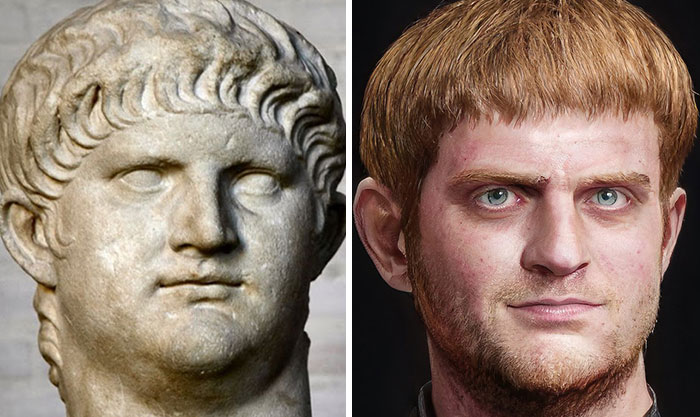
Nero (emperor, 54-68 CE)
†Alexei Navalny 1976-2024)†
trailer of Oscar-winning documentary Navalny (2022)
Study Guide for Examination #1 (Wednesday, February 21)
Petronius (d. 66 CE): forced suicide @Tacitus, Annales 16.18-19 (elegantiae arbiter, "judge of taste"; consul, 62 CE)
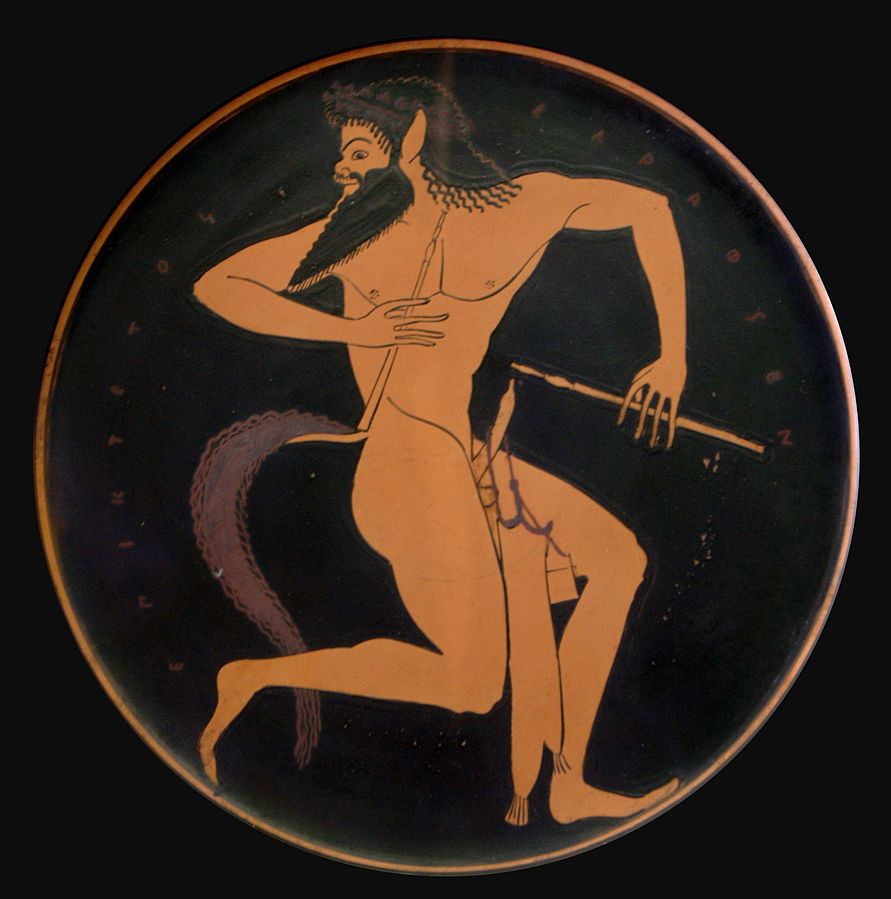

L: Silenus/satyr (Attic red-figure plate, ca. 520-500 BCE): R: fresco of Priapus (Casa dei Vettii, Pompeii)
- Satyricon ("satyr stories"): satirical Roman Odyssey of sexual misadventures, "hero" narrator Encolpius harried by Priapus (cf. Odysseus by Poseidon) in gritty, un-idealized account of non-elite everyday life (e.g. markets, public squares, rhetorical schools, brothels, etc.); "Dinner at Trimalchio's"
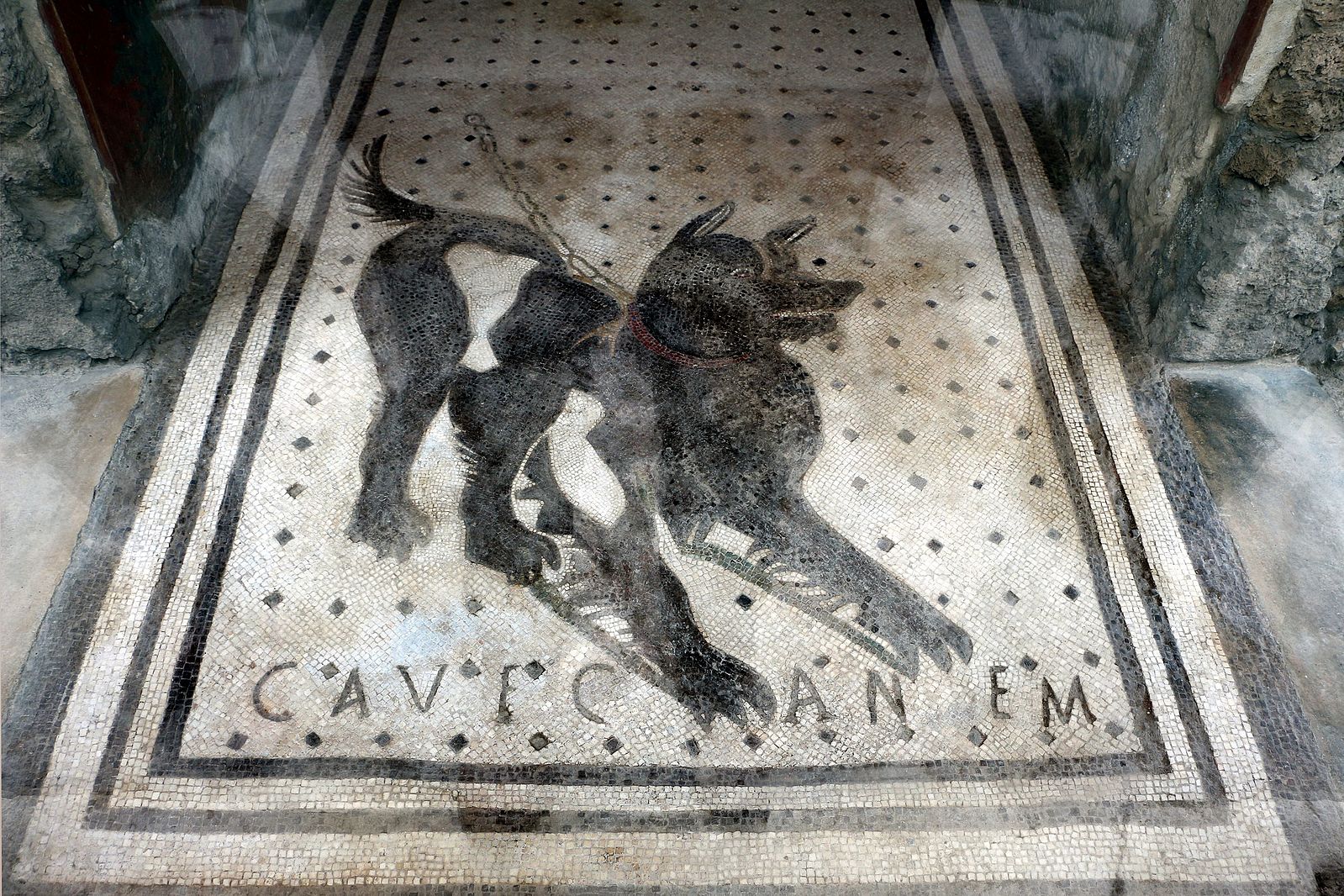
"Beware of Dog" mosaic (House of the Tragic Poet, Pompeii)
- Trimalchio's status & personal history: deracinated Asian, "at the age of fourteen I was my master's favourite—there's no shame in doing your master's bidding. Mind you,I used to keep the mistress happy as well . . . I'm not one to brag" (76); inheritance from master; 5 ships lost in first venture, second fleet ("wine, bacon, beans, perfumes, slaves", 76) + Fortunata's gold pieces; "There and then I cleared the debt on all the estates which had belonged to my patron. I built a house, put money into slaves and cattle; everything I touched grew like a honeycomb. Once I reached the stage of being richer than the whole community, I threw my hand in, and retired from commerce. I began employing freedmen as agents in money-lending" (76).
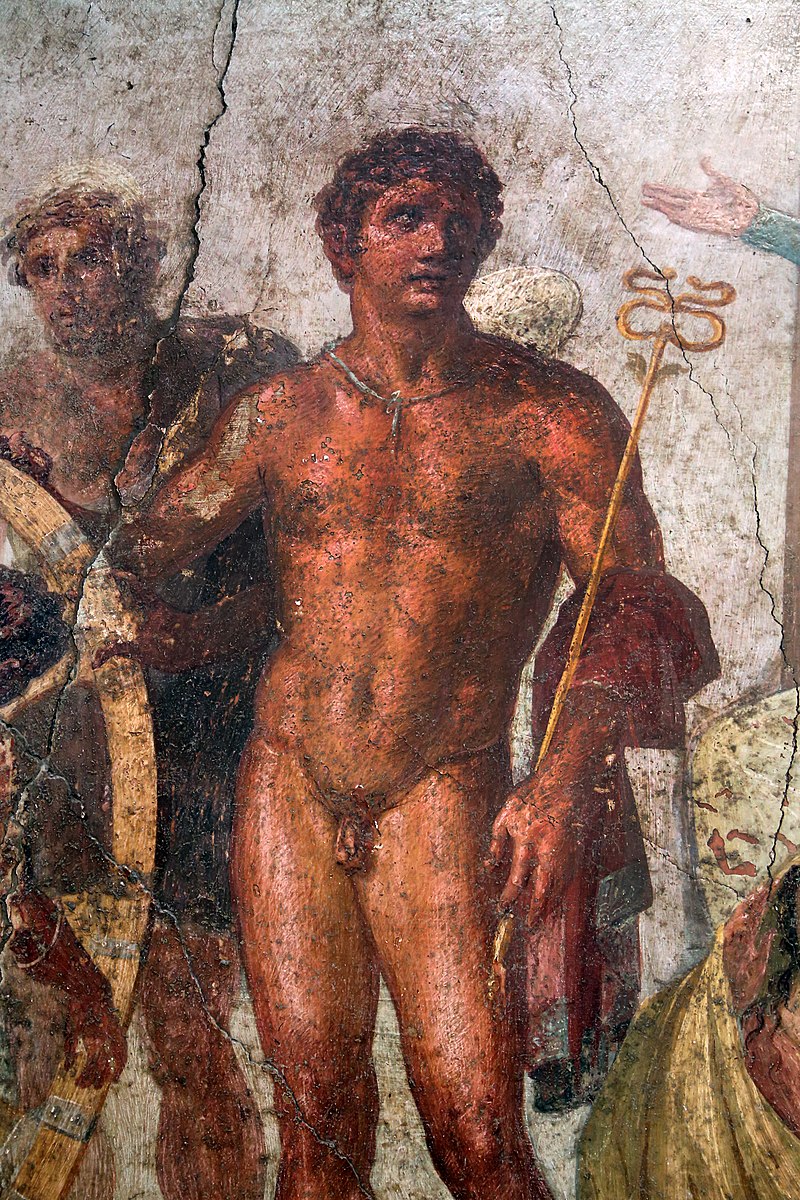
Mercury (fresco in the Casa dei Vettii, Pompeii)
- Trimalchio's narrative fresco: social death > apotheosis (cf. Mercury Psychopompus, "Guider of Souls")
Petronius, Satyricon 29 (Encolpius recovers from seeing the painted dog)
I gathered my wits, and proceeded to examine the entire wall. There was the representation of a slave market, with placards bearing the names and prices of the slaves. Trimalchio himself was there, sporting long hair and holding a herald's wand; Minerva was escorting him on his entry into Rome. Next the painter had carefully and scrupulously depicted, with commentary below, the detail of how Trimalchio had learnt accountancy, and had then become a steward. At the end of the colonnade, Mercury had raised him by the chin, and was bearing him up on to a lofty dais. Fortune with her horn of plenty was in attendance, and the three Fates were there spinning their golden threads.
- Trimalchio's obsessions: wealth, status, style (colorful & pretentious clothing, esp. purple), theatrical & lavish food presentation, astrology & superstition, digestion (TMI!), puns, time, death (30 yrs, 4 months, 2 days to live, 77)
- Trimalchio's (contradictory) style of mastery: inscription, "Any slave leaving the house without his master's bidding will receive a hundred stripes" (28); dinner arrangment to avoid "stinking slaves" (34); boy acrobat falls on Trimalchio ("a slave began to get the belt for having bandaged his master's bruised arm with white wool instead of purple", 54)
Petronius, Satyricon 30 (pretentious steward & vicarius seeking mercy)
"It is not so much the loss that annoys me", he said, "as that good-for-nothing slave's dereliction of duty. He lost my dining-out clothes given to me by one of my dependants for my birthday. They were Tyrian of course, but they had been laundered once; so the loss is of no account."
[slaves given wine, 64ff, join free guests
for reading of will & final funeral scene, 70ff.]
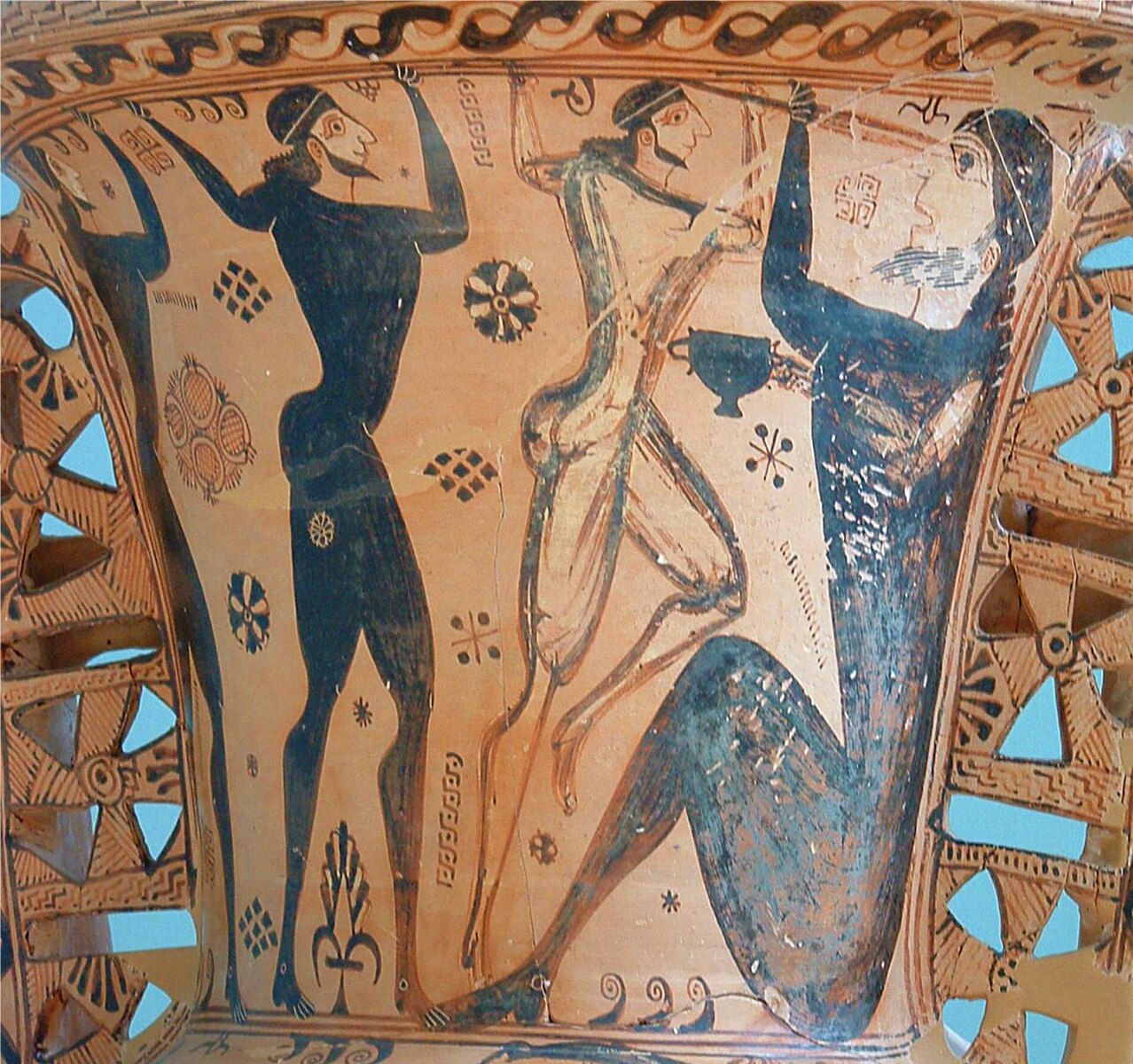
Odysseus blinds Polyphemus (proto-Attic amphora, 7th century BCE)
- Trimalchio's (elite) social aspirations: pretentious bragging, "learning" (mythology, literature), e.g. "I'm trying to join Sicily to my little estates, so that if I take a fancy to go to Africa, I can still sail there by way of my own territory" (48), "Ulysses had his thumb twisted off by the Cyclops with his pincers?" (48), "At the capture of Troy . . . Hannibal piled all the statues of bronze, gold and silver on a pyre, and set fire to them" (50), report of estates' accounts, etc., as if imperial communiqué (53)
_Brutus,_denarius,_54_BC,_RRC_433-1.jpg)
Coin minted by M. Junius Brutus, with lictors bearing fasces (R; 54 BCE)
Petronius, Satyricon 30 (Trimalchio one of local seviri Augustales)
I was particularly surprised to see a bundle of rods and axes attached to the doorposts, supported below by what seemed to be the bronze beak of a ship, containing the inscription: "To Gaius Pompeius Trimalchio, member of the sextet of the College of Augustus. Presented by his steward Cinnamus." A two-branched lamp with the same inscription hung from the ceiling. There were also two panels set in the two door posts. If my memory serves me right, one of them had this inscription: "Our Gaius dines out on 30th and 31st December." The other depicted the course of the moon, with representations of the seven planets. Days of good and evil omen were marked with distinctive counters.
- other freedmen: (non-elite) dinner conversations during Trimalchio's absence, 41-6; conflict with Encolpius & other educated guests
- Fortunata, freedwoman wife of Trimalchio: "she measures her wealth by the bushel . . . you wouldn't have taken a bread-roll from her hand" (37); influential in Trimalchio's household, jewelry exchange/display with Scintilla
Petronius, Satyricon 67 (humiliation scene)
Meanwhile the women were tipsily giggling at each other, and exchanging drunken kisses, as one boasted of her conscientious role as female head of the household [materfamilias], and the other complained of her husband's boy-favourite and neglect of her. While they were engaged with each other in this way, Habinnas quietly got to his feet, seized Fortunata by the legs, and threw her over the couch. "Ouch, ouch!" she cried as her petticoat rose above her knees. She then took refuge in Scintilla's lap, and blushing rosy-red, hid her face in her napkin.
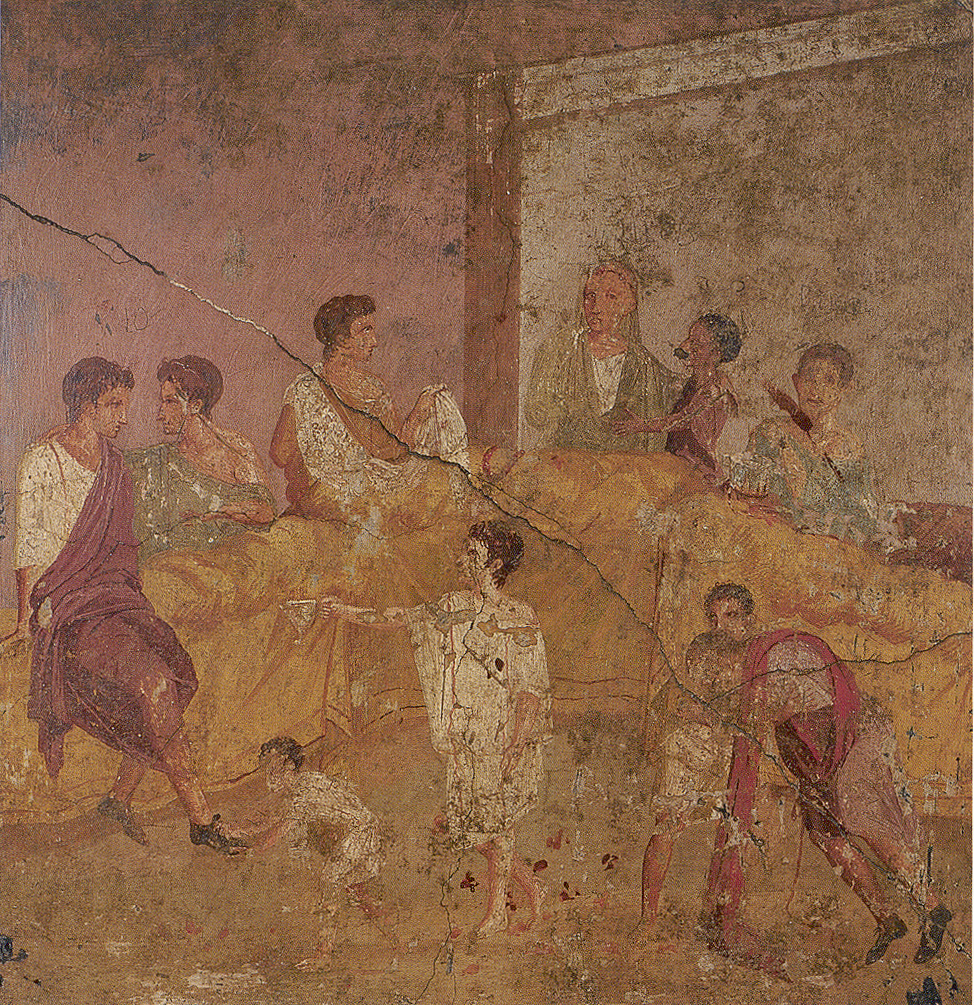
Petronius, Satyricon 74 (domestic violence scene after Trimalchio kisses slave-boy)
Trimalchio's reaction was to remark: "So does my flute-girl not recall that I rescued her from the slave-stand, and made her fit for human company? Yet here she is, puffing herself up like a frog, and giving herself airs. Thick as a plank she is—she's no woman. But if you're born in the shed outside, you don't aspire to the mansion . . . I could have married into ten million though I hadn't a penny to my name; you know I'm not telling fibs. Agatho in the perfume shop took me aside the other day, and said: 'I do urge you not to let your line die out.' But being a decent sort, not wanting to appear unfaithful, I've shot myself in the foot . . . Habinnas, I won't have you put her statue on my tomb, so that at least when I'm dead I won't have any argy-bargy. In fact, to impress on her that I can do her a bad turn, don't let her kiss me when I'm dead."
- Trimalchio's will: a regular dinner-party occurence?
Petronius, Satyricon 71 (Trimalchio's aspirations after death)
"My friends," he said, "slaves too are men; they have drunk their mother's milk like the rest of us, even if a malign fate has overtaken them. But so long as I'm spared, they will soon taste the water of freedom. In short, I intend to free them all in my will: I'm also bequeathing a farm and his concubine to Philargyrus, and to Cario a block of flats, his manumission tax, and a bed complete with bedcovers. As for Fortunata, I'm making her my heiress, and commending her to all my friends. I'm making all these arrangements generally known, so that my household can show me now the affection due when I'm dead." They all began to express thanks for their master's generosity. He then abandoned all badinage, and ordered a copy of his will to be brought in. He read out the entire document from beginning to end, to the accompaniment of lamentations from the household. He then looked over at Habinnas. "Tell me, my dearest friend," he said, "will you order my tomb according to my instructions? My earnest request is that you set my little dog below my statue, and put in garlands, perfumes, and all the contests of Petraites: so that through your kindness my life can continue after death. Build it a hundred feet wide at the front, and two hundred feet from front to rear. I'd like fruit trees of all kinds surrounding my ashes, and lots of vines; it's quite wrong for a man to have an elegant house in life, and not to give thought to our longer place of residence. So before all else I want an inscription with the words 'This tomb must not pass to an heir.' I'll be careful to stipulate in my will that I come to no harm when dead; I'll appoint one of my freedmen to mount guard over my tomb, to ensure that people don't make a beeline to shit against it. I want you also to depict ships in full sail, and myself sitting on a dais wearing the toga with a purple stripe and five gold rings, dispensing coins from a wallet to the people at large; you know that I laid on a dinner for them at two denarii a head. If you will, incorporate dining-halls as well, and all the citizens having a good time in them. On my right erect a statue of my Fortunata holding a dove, and leading along her puppy with its jacket on. Put in my boy favourite, and some big winejars sealed with gypsum to ensure that the wine doesn't leak out. You can show one of the jars as broken, with a slave weeping over it. Put a sundial in the middle, so that whoever wants to know the time will read my name, whether he wants to or not. Oh yes, and give some thought to whether this inscription strikes you as suitable enough: 'Here rests Gaius Pompeius Trimalchio of the household of Maecenas. He was formally declared Priest of Augustus in his absence; Though he could have claimed membership of every Roman guild, he refused. He was god fearing, brave and faithful. He grew from small beginnings and left thirty million, without ever hearing a philosopher lecture: Farewell, Trimalchio; and fare well, you who read this."'
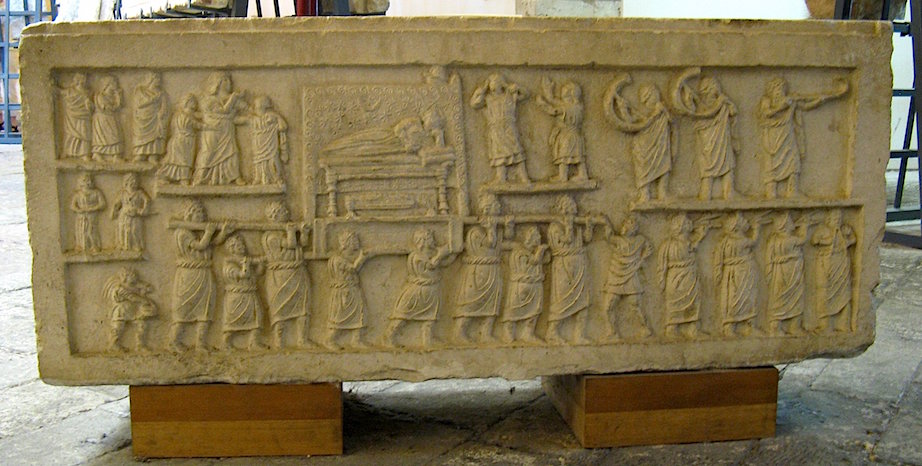
Funeral procession (Amiternum, 50 BCE)
- Trimalchio's "funeral" & narrator's escape from labyrinth/house
dinner scene from Fellini's Satyricon
.jpg)
Practice commentary:
(1) identify the author;
(2) identify the title of the work from which the passage is taken;
(3) briefly describe the context in which the passage occurs;
(4) write a carefully organized paragraph or two commenting on the broader significance of the passage in light of our main course themes (slavery & freedom) and the specific topics we have covered so far.
Speaker A
It was to show that the reason the boys consider you to be so approachable
And jovial is not because your life is truly just and good at the core,
But only because you agree with whatever they want, spoil them,
And lavish money on them, Micio. Now if my way of living is so repulsive to you,
Aeschinus, just because I don’t indulge you in whatever you do, regardless of
Whether it’s right or wrong—I’m through here. Buy, squander, do whatever you want!
But when you’re not seeing things clearly because of your age,
Or pulled along too much by your desires and too little by your brains,
If you want me to grab hold of you and straighten you out or provide some support
When it’s needed, I’ll be there for you.
Speaker B
We admit it, father:
You know what's best. But what about my brother? What happens to him?
Speaker A
I'll let him keep her, but this is the last time.







_Brutus,_denarius,_54_BC,_RRC_433-1.jpg)


.jpg)